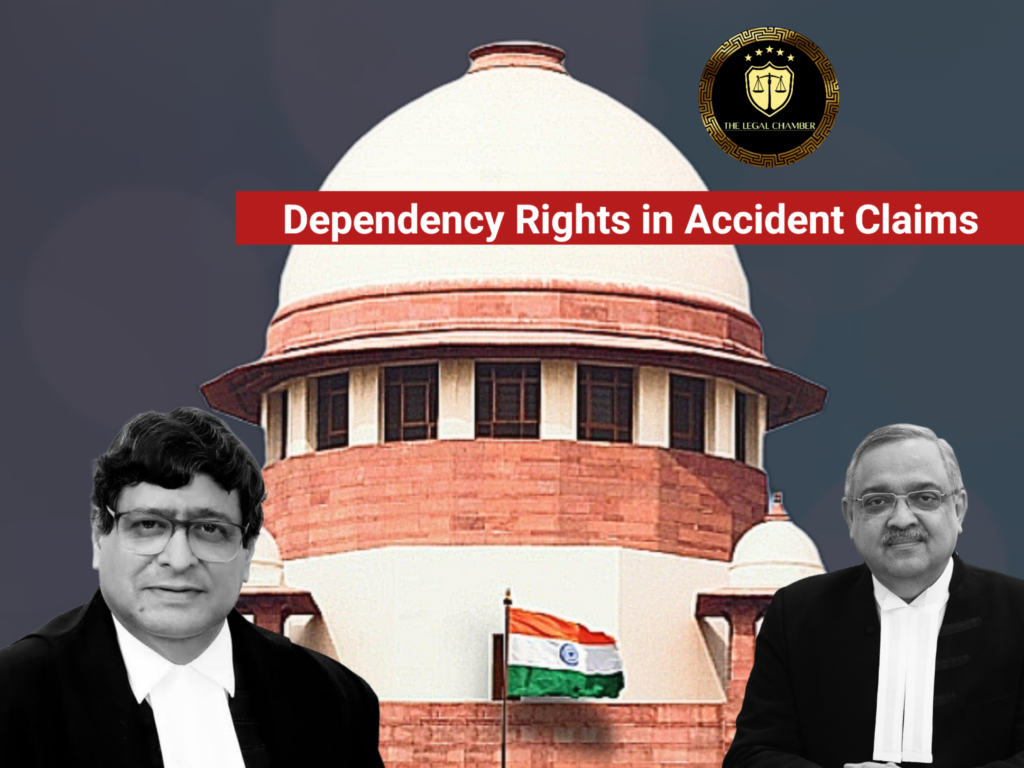
The Supreme Court upheld the High Court’s decision denying enhanced compensation to the married daughter (Appellant No. 1) under the Motor Vehicles Act, 1988, as she failed to prove financial dependency on the deceased. However, it reversed the dismissal of the mother’s (Appellant No. 2) claim, awarding her ₹19.22 lakhs, recognizing her dependency and applying principles from Pranay Sethi and Sarla Verma for just compensation. The ruling clarified that legal heirs must establish dependency for loss-of-income claims, except under Section 140’s no-fault liability.
Facts Of The Case:
On January 26, 2008, Smt. Paras Sharma died in a road accident when a Rajasthan Roadways bus, negligently taking a sudden right turn, crushed her two-wheeler. Her married daughter (Appellant No. 1) and elderly mother (Appellant No. 2) filed a claim petition seeking ₹54.30 lakhs under the Motor Vehicles Act, 1988. The Motor Accidents Claims Tribunal awarded ₹15.97 lakhs, presuming 50% dependency and applying a multiplier of 11. The High Court later reduced the daughter’s compensation to ₹50,000 under Section 140 (no-fault liability) and denied the mother’s claim, citing lack of dependency.
The Supreme Court upheld the High Court’s decision regarding the daughter, noting she failed to prove financial dependence post-marriage. However, it overturned the denial of the mother’s claim, recognizing her dependency on the deceased, who was her sole provider. The Court recalculated compensation for the mother at ₹19.22 lakhs, factoring in future prospects, filial consortium, and loss of estate, following precedents like Pranay Sethi and Sarla Verma. The ruling emphasized that while legal heirs must prove dependency for loss-of-income claims, parents in indigent circumstances qualify as dependents, even if future dependency is speculative. The insurer, owner, and driver were held jointly liable for the enhanced amount.
Procedural History:
The case originated with a claim petition filed before the Motor Accidents Claims Tribunal by the deceased’s daughter (Appellant No. 1) and mother (Appellant No. 2) seeking compensation of ₹54.30 lakhs. The Tribunal awarded ₹15.97 lakhs in 2011, holding the bus driver, owner, and insurer jointly liable. Dissatisfied, both the claimants and the insurer filed appeals before the Rajasthan High Court. In 2018, the High Court reduced the daughter’s compensation to ₹50,000 under Section 140 of the Motor Vehicles Act while completely dismissing the mother’s claim. The claimants then approached the Supreme Court through a special leave petition in 2018, which was converted into a civil appeal. In its 2025 judgment, the Supreme Court partially allowed the appeal – it upheld the High Court’s decision regarding the daughter but reinstated and enhanced the mother’s compensation to ₹19.22 lakhs, modifying the High Court’s order while affirming the Tribunal’s finding on liability. The Supreme Court’s ruling thus represented the final stage in this litigation spanning over 17 years from the date of the accident.
Court Observation:
The Supreme Court made several key observations while delivering its judgment. It noted that while a married daughter remains a legal heir under Section 166 of the Motor Vehicles Act, she must prove actual financial dependency to claim compensation for loss of income, which Appellant No. 1 failed to establish. The Court emphasized that Section 140’s no-fault liability provides a minimum fixed compensation regardless of dependency, justifying the ₹50,000 award to the daughter. Regarding the mother (Appellant No. 2), the Court strongly affirmed that aged parents can be considered dependents, observing that the obligation to maintain parents is as sacred as a parent’s duty to support minor children. It criticized the High Court for ignoring evidence of the 70-year-old mother’s complete dependency on her deceased daughter. The judgment clarified that potential future dependency, especially for elderly parents without independent income, deserves recognition in compensation claims. Applying precedents like Pranay Sethi and Sarla Verma, the Court systematically recalculated compensation components including future prospects (15% addition), filial consortium (₹40,000), and standardized amounts for funeral expenses and loss of estate, setting a comprehensive framework for similar cases.
Final Decision & Judgement:
In its final judgment, the Supreme Court partially allowed the appeal while modifying the compensation structure. The Court upheld the High Court’s decision limiting the married daughter (Appellant No. 1) to ₹50,000 under Section 140 of the Motor Vehicles Act, finding no evidence of financial dependency post-marriage. However, it overturned the High Court’s dismissal of the mother’s (Appellant No. 2) claim, recognizing her as a dependent entitled to full compensation. Applying the principles laid down in Pranay Sethi and Sarla Verma, the Court awarded the mother ₹19,22,356, comprising ₹18,52,356 for loss of future income (calculated with 15% future prospects and 50% personal expense deduction), ₹40,000 for filial consortium, and ₹30,000 combined for funeral expenses and loss of estate.
The judgment reaffirmed that insurers bear strict liability for third-party claims while clarifying that dependency must be factually established except in no-fault liability cases. The Court directed Respondent No. 1 (National Insurance Company) along with the bus owner and driver to jointly and severally pay the enhanced compensation with 6% interest from the claim petition’s filing date, providing complete relief to the aged mother while settling the legal position on dependency claims by different categories of legal heirs.
Case Details:
Case Title: Deep Shikha & Anr. vs. National Insurance Company Ltd. & Ors. Citation: 2025 INSC 675 (Supreme Court of India) Special Leave Petition (Civil) No(s). 22265-22266 of 2018 Date of Judgment: May 13, 2025 Judges/Justice Name: Hon'ble Mr. Justice Sudhanshu Dhulia & Hon'ble Mr. Justice K. Vinod Chandran
Download The Judgement Here